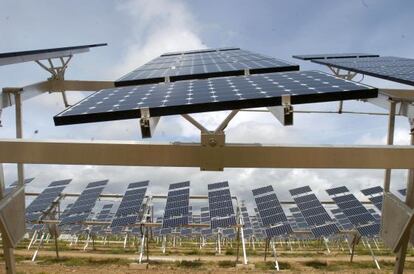Supreme Court backs cuts to solar power producers’ earnings
Judges rule that reducing premiums paid for photovoltaic energy do not breach principle of legal security

The Supreme Court has ruled that a number of ministerial orders cutting the annual premiums received by producers of photovoltaic power in the years 2011-2013 did not undermine the concept of legal security.
The orders – which were approved by the then-Industry Minister Miguel Sebastián in the former Socialist government of Prime Minister José Luis Rodríguez Zapatero, and included in a royal decree – reduced the number of hours for which photovoltaic power producers could receive premium rates for the energy they generated.
The court ruled that these producers did not have an immutable right to such incentives, adding that the aim of the decree was to reduce the so-called tariff deficit – the difference between the actual cost of energy produced by power utilities and the regulated rates they are allowed to charge consumers.
Photovoltaic installations “do not have a right […] for the economic regime that regulates the retributions they receive not to be changed,” the ruling said. It said the changes to that economic regime were not of a scope that “substantially undermined” its basic nature.
In their judgment dated January 13, and made public on Monday, the judges also ruled that the premium reductions did not breach European Union Treaty laws and did not constitute arbitrary exercise of public powers.
The ruling did recognize that the ministerial orders have produced a “reduction in the forecast of earnings initially forecast” but did not consider that this development was “contrary to the principles of legal security and legitimate expectations.” It went on to say that “the evolution of the energy sector, conditioned by the increase in the tariff deficit, was putting the financial sustainability of the electricity system at risk.”
According to official figures released Monday, the deficit in November alone was 3.454 billion euros, a reduction of 1.027 billion on the previous month.
The Supreme Court also noted that photovoltaic power producers had opted to buy into a public system for fixing their retributions rather than seeking to tap the market, an option that is still open to them.
The cuts to what was paid to photovoltaic power producers constituted the key aspect of the decree aimed at reining in the tariff deficit. The move was heavily criticized by both national and international investors in the photovoltaic sector, who are seeking redress for the move through international arbitration.
The Supreme Court’s ruling came in response to a suit filed by 14 photovoltaic power producers.
An estimated 30,000 households invested in solar energy installations under the government’s scheme to boost the renewable energy sector, with many of them claiming that they now face bankruptcy after taking out loans and mortgaging their homes to do so.
The government program also encouraged a number of manufacturers to enter the market for equipment required for photovoltaic installations. At one point in 2010, there were about 70 companies in the sector but now only a handful remain.
Tu suscripción se está usando en otro dispositivo
¿Quieres añadir otro usuario a tu suscripción?
Si continúas leyendo en este dispositivo, no se podrá leer en el otro.
FlechaTu suscripción se está usando en otro dispositivo y solo puedes acceder a EL PAÍS desde un dispositivo a la vez.
Si quieres compartir tu cuenta, cambia tu suscripción a la modalidad Premium, así podrás añadir otro usuario. Cada uno accederá con su propia cuenta de email, lo que os permitirá personalizar vuestra experiencia en EL PAÍS.
¿Tienes una suscripción de empresa? Accede aquí para contratar más cuentas.
En el caso de no saber quién está usando tu cuenta, te recomendamos cambiar tu contraseña aquí.
Si decides continuar compartiendo tu cuenta, este mensaje se mostrará en tu dispositivo y en el de la otra persona que está usando tu cuenta de forma indefinida, afectando a tu experiencia de lectura. Puedes consultar aquí los términos y condiciones de la suscripción digital.








































